January 2024

We create avenues for the industry to gain more insights into emerging trends, industry-specific problems of national importance, and global best practices in logistics & supply chain management. We enable the industry to cut down transaction costs, increase efficiency, and enhance profitability. We are committed to sensitizing the industry about macro-level issues and helping find solutions to them.
News highlights from the world of supply chain and logistics that appeared in media over the last one month
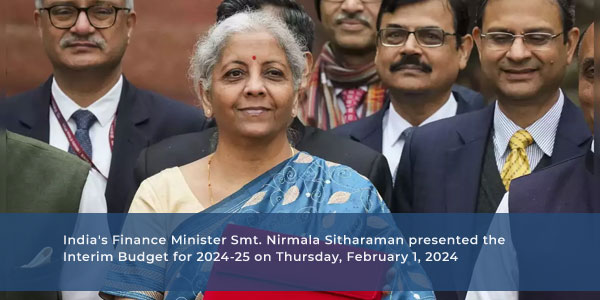
|
| India's Finance Minister Smt. Nirmala Sitharaman presented the Interim Budget for 2024-25 on Thursday, February 1, 2024. In her budget speech, she said that the "Government under the leadership of Hon’ble Prime Minister doubled down on its responsibilities to build a prosperous country with comprehensive development of all people and all regions. Our Government strengthened its ‘mantra’ to ‘Sabka Saath, Sabka Vikas, and Sabka Vishwas’. Our development philosophy covered all elements of inclusivity." Some key highlights of the interim budget pertaining to the supply chain and logistics sectors included the announcement of implementing three major economic railway corridor programmes, namely, the energy, mineral and cement corridors, port connectivity corridors, high traffic density corridors. "The projects have been identified under the PM Gati Shakti for enabling multi-modal connectivity. They will improve logistics efficiency and reduce cost," she said and added, "Together with dedicated freight corridors, these three economic corridor programmes will accelerate our GDP growth and reduce logistic costs." Other highlights included the doubling of the number of airports to 149, along with the rollout of air connectivity to tier-two and tier-three cities under the UDAN scheme and strengthening the e-vehicle ecosystem by supporting the manufacturing and charging infrastructure. You can read the complete interim budget speech here. |
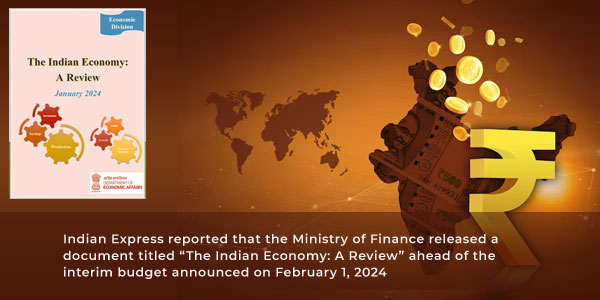
|
| Indian Express reported that the Ministry of Finance released a document titled “The Indian Economy: A Review” ahead of the interim budget announced on February 1, 2024. The review stated that "the robustness seen in domestic demand, namely, private consumption and investment, traces its origin to the reforms and measures implemented by the government over the last ten years. The supply side has also been strengthened with investment in infrastructure – physical and digital – and measures that aim to boost manufacturing. These have combined to provide an impetus to economic activity in the country. Accordingly, in FY25, real GDP growth will likely be closer to 7 percent." Clarifying that the document is not an “Economic Survey of India” but one that highlights the journey and progress of the Indian economy in this decade, India’s Chief Economic Advisor to the government, Shri V Anantha Nageswaran stated that “The Union government has built infrastructure at a historically unprecedented rate, and it has taken the overall public sector capital investment from Rs 5.6 lakh crore in FY15 to Rs 18.6 lakh crore in FY24, as per budget estimates. That is a rise of 3.3X. Whether the total length of highways, freight corridors, number of airports, metro rail networks or the trans-sea link, the ramp-up of physical and digital infrastructure in the last ten years is real, tangible and transformative,” according to the publication. |
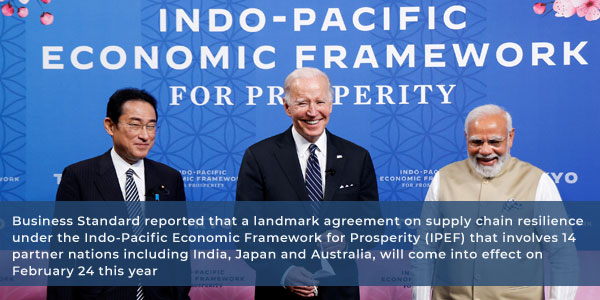
|
| Business Standard reported that a landmark agreement on supply chain resilience under the Indo-Pacific Economic Framework for Prosperity (IPEF) that involves 14 partner nations including India, Japan and Australia, will come into effect on February 24 this year. Quoting the US Commerce Secretary Gina Raimondo, the paper said that the pact will facilitate a collaborative approach to strengthen supply chains and prevent potential disruptions. The supply chain agreement establishes a framework for deeper collaboration between partner nations for prevention and mitigation of supply chain disruptions, such as those experienced during the pandemic years. The objective of the agreement is to build resilient, efficient, productive, sustainable, transparent, diversified, secure, fair, and inclusive supply chains, said the statement. "This is a critical step in bringing the landmark, first-of-its kind agreement into action and promoting coordination among the IPEF partners on building resilient, efficient, productive, sustainable, transparent, diversified, secure, fair, and inclusive supply chains," it added. Along with India, Japan and Australia, the other member nations of the IPEF are Brunei Darussalam, Fiji, Indonesia, South Korea, Malaysia, New Zealand, the Philippines, Singapore, Thailand, and Vietnam. The IPEF was formed in May 2022 for a deeper cooperation between participating countries in areas like clean energy, supply-chain resilience and digital trade. |
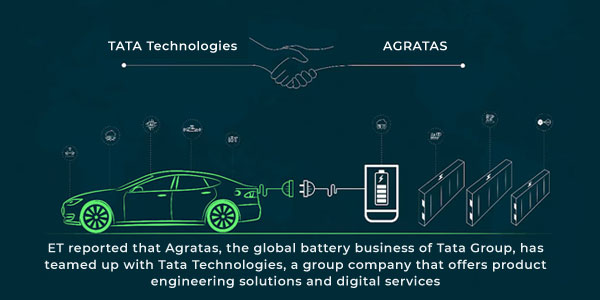
|
| ET reported that Agratas, the global battery business of Tata Group, has teamed up with Tata Technologies, a group company that offers product engineering solutions and digital services. The collaboration will help scale Agratas' product development and enterprise systems, enabling the design, development and manufacturing of world-class battery solutions. The article stated that the two companies will use Tata Group’s unified approach wherein Tata Technologies will create the digital business architectures to support the production of high-quality battery solutions at Agratas’ gigafactories in India and the UK. The partnership reflects Tata Group’s vision to create a holistic eMobility ecosystem that will promote the use of Electric Vehicles in India and around the world. Battery cell production is expected to start in 2026, the article noted. |
INTERNATIONAL
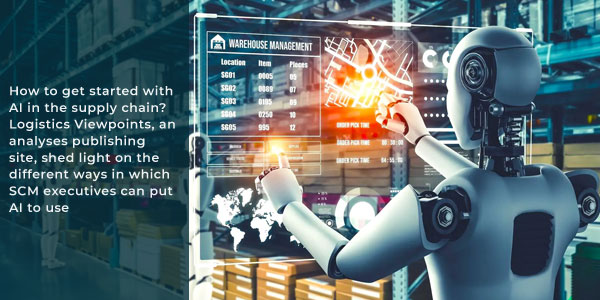
|
| How to get started with AI in the supply chain? Logistics Viewpoints, an analyses publishing site, shed light on the different ways in which SCM executives can put AI to use. The article recommended starting with formulating the AI strategy that encapsulates an understanding of one's organization’s supply chain and its data. The second step would be to prevent pockets of isolation by integrating AI into one's supply chain in a manner that the results are aligned end to end. The third step would be to be a change leader, which would mean that your team is using the technology effectively. The article also covered a particular type of AI called generative AI and discussed its uses in the supply chain. |
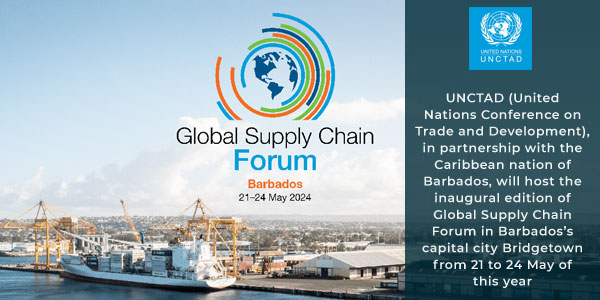
|
| UNCTAD (United Nations Conference on Trade and Development), in partnership with the Caribbean nation of Barbados, will host the inaugural edition of Global Supply Chain Forum in Barbados’s capital city Bridgetown from 21 to 24 May of this year. A key highlight of the event will be the Supply Chain Innovation challenge. According to the organizers, the objective behind the Challenge is to inspire people to create innovative solutions that could make global production and distribution networks greener and more efficient and resilient. Details are provided on the event's website. The forum will take up a host of topics to deliberate, including digitalization, food security, transport costs, climate change, developing countries’ financing needs, and how to better manage the energy transition in international transport. |
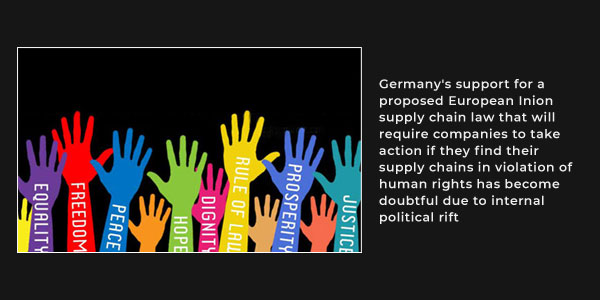
|
| Germany's support for a proposed European Union supply chain law that will require companies to take action if they find their supply chains in violation of human rights has become doubtful due to internal political rift. The political conflict arose out a concern that the supply chain law "it creates considerable bureaucracy and legal uncertainties." Germany's business associations have asked Chancellor Olaf Scholz to veto the planned law, saying the proposals were "neither practicable nor proportionate." A recent industry survey in Germany showed how a less-strict national supply chain law that came into effect in 2023 made many companies reduce the size of their supplier networks, with some even considering reducing the presence in certain countries entirely. |
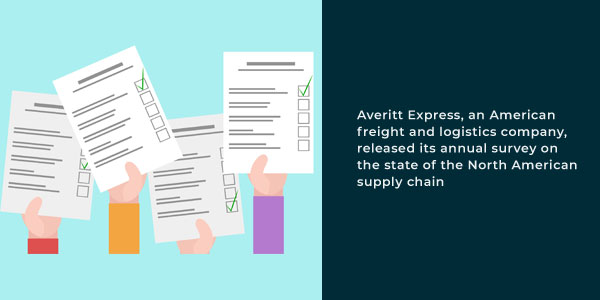
|
| Averitt Express, an American freight and logistics company, released its annual survey on the state of the North American supply chain. The survey asked more than 1,400 shippers from different sectors about the challenges they faced during 2023 and their expectations for 2024. According to the survey results, most shippers (67%) expect to ship more goods in 2024 than in 2023, and they plan to use more air cargo (26%) and rail services (20%) in 2024 than in 2023. The survey also revealed that almost half of the shippers (46%) consider a carrier's sustainability program highly important for their decision-making, and that the biggest challenge for international shippers in 2023 was customs clearance, which increased by 5 percentage points from 2022. The survey shows an overall optimistic outlook for the supply chain industry in 2024. |

|
| A Supply Chain Brain feature discussed the importance of green marketing and the legal challenges green marketing poses for businesses. Green marketing is the promotion of products or services highlighting the degree to which they are environmentally friendly and/or sustainable. However, green marketing practices need to be accurate and responsible, or else they can lead to legal problems and penalties. The article explained two key regulatory frameworks that businesses that practice green marketing need to follow: the EU Green Claim Directives and the U.S. FTC Green Guides. These frameworks provide rules and guidance on how to use environmental claims in marketing communications, such as requiring scientific evidence, third-party certification, or data to support the claims. The article also cautioned that these frameworks are constantly evolving and updating, so businesses need to stay informed and compliant. |
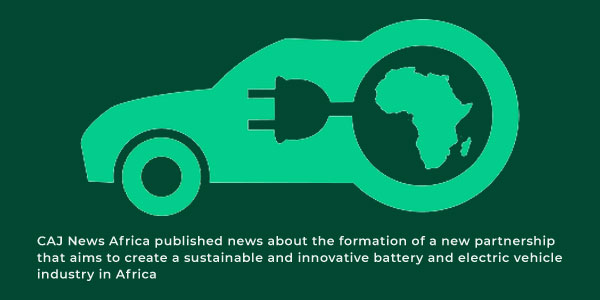
|
| CAJ News Africa published news about the formation of a new partnership that aims to create a sustainable and innovative battery and electric vehicle industry in Africa. ReElement Technologies, a provider of high-performance refining capacity of rare earth and critical battery elements, and Afrivolt, a large industrial projects developer agreed to work together to build a closed-loop lithium-battery and electric vehicle manufacturing ecosystem in Africa. The two companies will use critical minerals from local sources and refine them with ReElement's technology. They will also collaborate with local institutions to train the future workforce for the African industry and manufacturing. The CEOs of the two companies expressed hope that partnership will benefit the African continent by providing technology, capital, and skills and affirmed their commitment toward this goal. |

|
| The approved merger of two big railroads in North America – Canadian Pacific and Kansas City Southern – is poised to have a major beneficial effect on the supply chain of the continent, reported the Real Economy. The $31-billion merger of the two major railroads giants will create a rail network that will connect both the coasts and traverse through the middle of the continent. The integrated network will support the supply chains of automotive industry and other businesses, benefitting all sectors of cross-border trade between Canada, Mexico, and the U.S., noted the publication. |
|
Interview of the Month
|
|

|
Mr. Ravikant Parvataneni, CEO, Argon & Co, India
shared with CII-IL newsletter team his organization’s perspective of the Indian supply chain sector, its significance and its present and potential demand drivers. |
| Argon & Co, a global management consultancy specializing in operations strategy and transformation, has presence in all major economies worldwide with over 500 consultants across Europe, America, Australasia, and India. How do you see the Indian market for supply chain services from a global perspective? What are the features that make it similar and set it apart? What are the top offerings as sought by your customers in India? |
| From a global perspective, Argon & Co recognizes the Indian market for supply chain services as a dynamic and rapidly evolving landscape. With a strong presence in all major economies, our firm acknowledges the significance of India in the context of operations strategy, transformation and growth. Similar to other global economies, the Indian market emphasizes efficiency, digitization, and sustainability in supply chain operations. However, what sets India apart is the unique combination of a vast and diverse market, coupled with intricate regulatory frameworks. Successfully navigating these complexities demands a tailored approach that aligns with local nuances. In India, our clients primarily seek assistance in designing their supply chain operations to support the next phase of growth and bring about a step change in efficiency. The historically fragmented nature of supply chains in India poses challenges for interventions in efficiencies and inventory planning. With GST implementation some of these challenges have eased out, but a lot still needs to be achieved by way of boost in infrastructure for both warehousing and transportation (all modes) before we start consuming these services at par with global peers. Despite these challenges, logistics services including warehouse design, operations improvements, automation and systems like WMS, TMS, etc. still continue to be at the forefront of our offerings. Looking ahead we anticipate a shift in landscape, with services focusing on planning and manufacturing taking the lead over the next few years. This shift aligns with the clear trend where manufacturing is expected to emerge as one of the lead drivers of a rapidly growing Indian economy. At Argon & Co, we are poised to deliver tailored solutions that blend our global expertise with an understanding of the local challenges and opportunities, ensuring our clients thrive in the evolving Indian supply chain market. |
| In the last few years, Argon and Co. has grown at a fast clip powered by a host of mergers, an infusion of growth capital, high-octane talent acquisition, and an ambitious scale-up of your global footprint. What are the present and potential demand drivers fuelling your fast-paced growth globally? |
| In recent years, Argon & Co. has experienced rapid growth, driven by a strategic combination of mergers, infusion of growth capital, high-calibre talent acquisition, and an ambitious global expansion. Particularly, post the pandemic, there has been a big focus on strengthening the supply chains, making them more resilient and less dependent on exports. This paradigm shift has significantly influenced how companies perceive their supply chains, prompting a heightened emphasis on operational improvements to enhance efficiencies. This trend is not only a short-term response but is poised to extend throughout the decade. Consequently, all facets of the supply chain, spanning procurement, manufacturing, planning, and logistics, are pivotal demand drivers fuelling our growth globally and specifically in the Indian market. Our ability to navigate the complexities of diverse markets, as discussed earlier, positions Argon & Co. as a key player in providing tailored solutions that align with the evolving needs of our clients. By leveraging our expertise in operations strategy and transformation, we are well-positioned to meet the rising demand for resilient and efficient supply chains on a global scale. |
| You are known for using digital and IT technologies like machine learning, data science, and IoT to provide outcomes in areas such as transformation management, sustainability, and channels to market. Logistics services in India are more talent and workforce-driven compared to other global markets where you have your presence. How do you balance technology and talent in delivering the desired business outcomes for your Indian clients? |
| At Argon & Co., our paramount focus is on delivering value to our clients, and we leverage IT technologies such as data science, machine learning and IoT as essential tools to achieve these objectives. While it is true that logistics services in India are more people driven compared to some other global markets, we approach the balance between technology and talent with a strategic perspective. Recognizing that logistics services in India are often more people-driven, we acknowledge the challenge of demonstrating quick paybacks for substantial investments in automation technologies. To address this, we adopt a hybrid approach where investments are strategically directed toward areas with a clear and rapid payback, or in situations where the sheer scale and volume make it impractical to rely solely on manual labour. The key to our approach is designing solutions for flexibility and scalability. In a dynamic market like India, where conditions can change rapidly over a span of 3-5 years, it's imperative that the capital investment particularly in technology are adaptable to evolving demands and high growth rates. Our emphasis is on ensuring that the technologies implemented not only deliver immediate efficiencies but also remain flexible enough to cater to the changing landscape, ultimately providing sustainable and scalable solutions for our clients. |
| What are the top sectors or verticals in India where you see the maximum growth potential for your supply chain service offerings and why? |
| To align with global expectations, India must experience rapid growth, and a pivotal driver for this growth is the expansion of the manufacturing sector across various industries. The government of India is taking steps in the right direction, offering incentives such as Production-Linked Incentives (PLI) across emerging sectors, like IT systems/hardware, electric vehicle (EV), core industries, healthcare. The emphasis on manufacturing is strategic, given its historically proven large multiplier effect in economy expansion. Having said that supply chain growth has been largely driven by retail, ecommerce and automotive sectors in last decade or two. Argon & Co India has been working with companies across all these categories to enable their rapid growth by designing a robust and scalable supply chain. Going forward, as manufacturing gains momentum, we anticipate significant growth potential across all aspects of the supply chain. The four key elements – sourcing/procurement, manufacturing, planning and distribution/logistics – will play integral roles in supporting the growing manufacturing landscape. This synergistic growth trajectory positions Argon & Co to provide tailored supply chain services, capitalizing on the increasing demands of a rapidly expanding manufacturing sector in India. |
We will connect again next month, with a comprehensive dossier of news, trends and events from the industry.
| Courtesy: Newsletter content developed by Mr. Aanand Pandey | ||